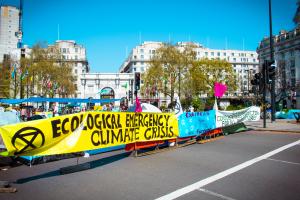
The story of Noah’s Ark indicates God’s desire for humanity to take care of and preserve animal life, making sure not one species becomes extinct. Noah, acting on what God told him to do, made sure the flood did not become a mass extinction event. The story shows how Noah, in his actions, fulfilled the stewardship that humanity had been granted over creation. It is a responsibility which did not end with Noah but continues with us to this day . Certainly, there are many ways to interpret the history behind the story, but what is important is not its historical roots, but the moral obligation it shows us that we have: humanity is called to protect life, to make sure no species becomes extinct.
Sadly, we find humanity does not want to fulfill its duty; instead, it seems so many, including and especially Christians, are indifferent not only to the environment, but the mass destruction of life which is happening all around them. More and more animals, indeed, more and more forms of life are nearing or going extinct. Just this week, it has been announced that it is too late for twenty two different animal species:
The ivory-billed woodpecker, which birders have been seeking in the bayous of Arkansas, is gone forever, according to federal officials. So is the Bachman’s warbler, a yellow-breasted songbird that once migrated between the Southeastern United States and Cuba. The song of the Kauai O’o, a Hawaiian forest bird, exists only on recordings. And there is no longer any hope for several types of freshwater mussels that once filtered streams and rivers from Georgia to Illinois.
In all, 22 animals and one plant should be declared extinct and removed from the endangered species list, federal wildlife officials planned to announce on Wednesday.[1]
Likewise, more and more species risk going extinct, as we find their numbers are drastically declining, so that, for example, there are billions of less birds alive today than there was in 1970.
Even if we were nihilists without concern for morality, we should care about this, for biodiversity is necessary for our own self-preservation. We need to share this world with other forms of life; if we let them perish, we could potentially experience our own extinction. Yet, from a Christian perspective, we should be concerned about the moral situation and realize that our own obligation to the world has not been met. We continue to have a duty to protect the earth and all that lives on it. The story of Noah is there to remind us we are obligated to preserve animal life. For, as Pope Francis said, we have no right to destroy the earth and all the species of life living on it:
It is not enough, however, to think of different species merely as potential “resources” to be exploited, while overlooking the fact that they have value in themselves. Each year sees the disappearance of thousands of plant and animal species which we will never know, which our children will never see, because they have been lost for ever. The great majority become extinct for reasons related to human activity. Because of us, thousands of species will no longer give glory to God by their very existence, nor convey their message to us. We have no such right. [2]
Pope Benedict XVI understood that it is often our business interests, our greed, which has caused many of us to abandon our duty and destroy what we should have protect:
Some business men and women, governments and financial groups are involved in programmes of exploitation which pollute the environment and cause unprecedented desertification. Serious damage is done to nature, to the forests, to flora and fauna, and countless species risk extinction. All of this threatens the entire ecosystem and consequently the survival of humanity.[3]
Indeed, Pope Benedict XVI here followed along with the analysis of St John Paul II, who understood our consumeristic activity as being behind much of the destruction we have caused. Indeed, he suggested that we followed the devil in trying to become self-made gods over the earth, and to do so, we have had to sacrifice and destroy the world around us to lift ourselves up to such positions of power and authority:
Equally worrying is the ecological question which accompanies the problem of consumerism and which is closely connected to it. In his desire to have and to enjoy rather than to be and to grow, man consumes the resources of the earth and his own life in an excessive and disordered way. At the root of the senseless destruction of the natural environment lies an anthropological error, which unfortunately is widespread in our day. Man, who discovers his capacity to transform and in a certain sense create the world through his own work, forgets that this is always based on God’s prior and original gift of the things that are. Man thinks that he can make arbitrary use of the earth, subjecting it without restraint to his will, as though it did not have its own requisites and a prior God-given purpose, which man can indeed develop but must not betray. Instead of carrying out his role as a co-operator with God in the work of creation, man sets himself up in place of God and thus ends up provoking a rebellion on the part of nature, which is more tyrannized than governed by him. [4]
How long will we abandon our duty and sacrifice the world around us, and all the various forms of life which live on it, for the sake of our inordinate pleasures? Will we see what is happening before it is too late, or will we, in our negligence, lead to our own demise? We still have time. We can still save ourselves, and the rest of the world, from destruction. We are in this together. And even if we think the cost to fix things is expensive, we need to realize, as Pope Francis said, the cost will be given greater if we do nothing:
Caring for ecosystems demands far-sightedness, since no one looking for quick and easy profit is truly interested in their preservation. But the cost of the damage caused by such selfish lack of concern is much greater than the economic benefits to be obtained. Where certain species are destroyed or seriously harmed, the values involved are incalculable. We can be silent witnesses to terrible injustices if we think that we can obtain significant benefits by making the rest of humanity, present and future, pay the extremely high costs of environmental deterioration. [5]
Whenever we hear about more animal species having gone extinct should make us realize the dire situation we find ourselves in. Each death should be seen as a sign. It should be our canary in a coal-mine. We have abandoned our duty for far too long. In the story of Noah, people ignored his warnings, and they died. Let us not ignore the warnings before us and perish from the face of the earth.
[1] Catrin Einhorn, “Protected Too Late: U.S. Officials Report More Than 20 Extinctions” in The New York Times (Sept 28, 2021).
[2] Pope Francis, Laudato si. Vatican translation. ¶33.
[3] Pope Benedict XVI, Africae Munus. Vatican translation. ¶80.
[4] Pope St. John Paul II, Centesimus Annus. Vatican translation. ¶37.
[5] Pope Francis, Laudato si’, ¶36.












